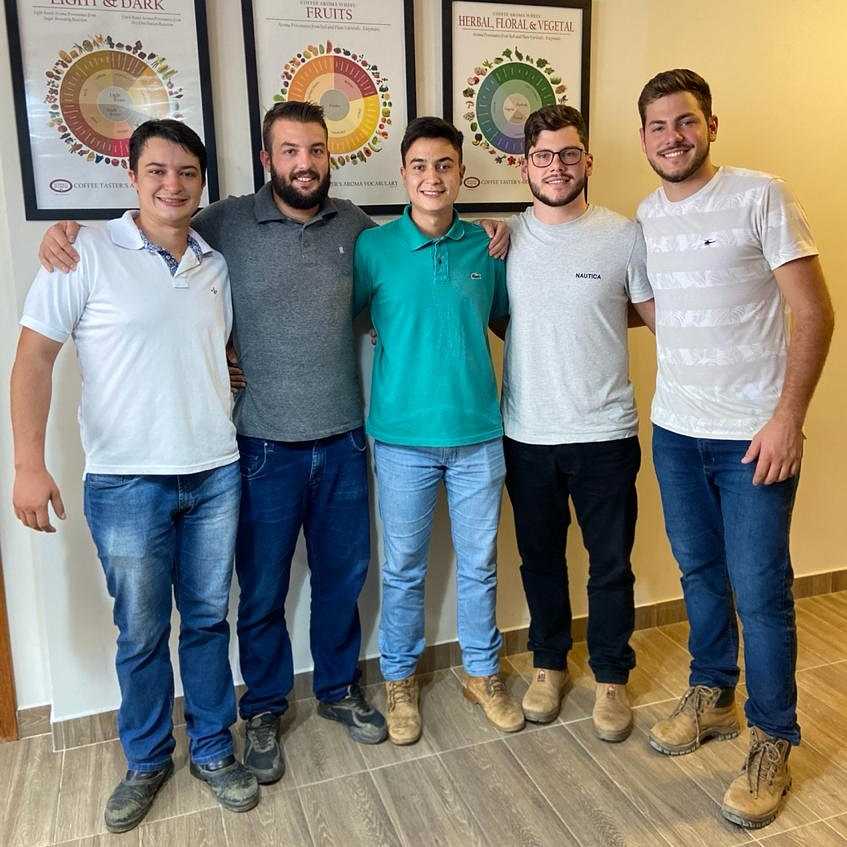MILAN – The Cup of Excellence of Brazil has just ended and we tackled it from the point of view of director Susie Spindler. We also interviewed the winner of the 2020 edition Luiz Ricardo Pimenta de Sousa, who gave us a very interesting picture of what is the life of a farmer and a family that for generations has carried out a quality discourse that today must be recognized by the market.
Luiz Ricardo, how is the life of a farmer?What’s it like everyday?
“Our property is completely family owned, with my mom, dad and the three of us as “children”. In the beginning, my father did not encourage us to stay in the field because it was a painful life – we would wake up early and go to sleep late every day, especially during the harvest season, and the day to day consumes our energy a lot. Therefore, we decided to go the other way and study, to bring knowledge and technology to our production.
My brother is an agricultural technician and I have a degree in food science. We always wanted to continue my father’s work because we knew the potential of the property and we always admired my parents’ dedication. Nowadays, as the coffee scale is very long, we divide the tasks: one brother takes care of the crops, another in the post-harvest part, and the other takes care of the finished product.”
Which are the main characteristics of your farm? Altitudes, climate conditions, terroir?
Luiz Ricardo: “The production unit where we produced the winning grain is 850 meters high, with slightly clayey soil that receives sunlight for an average of 6 hours a day. The climate is temperate and the humidity is quite high as it is a valley. This year has been atypical in terms of the amount of rain – it rained a lot and at the right time.
Is it all cultivated by coffee plants or with other cultures?
“ In addition to 20% of preservation forest, we have some avocado trees, and we intend to invest in other types of avocado for export in the future.”
What are the type of coffees that you produce and with which methods?
“At the beginning of the harvest, we do a pre-test to understand which method will generate the best result for that production. We have different methods and each year, depending on climatic conditions and each production, the ideal method can change. For this year’s Cup of Excellence, the method used was washed coffee.”
What is the necessary know-how to do it in a professional way?
“We used to say that the more you listen, the less you know. People must always be open to learn more. We have to be humble to always seek information, ask for help, go after training and learn all the techniques. It is very important to have a repertoire and research a lot to understand about all the methods and processes of coffee production, in addition to knowing the market to understand consumer habits and adapt to it. Also, it is essential to be kind to pass this knowledge on.”
When and why have you decided to be a farmer?
“Our grandparents were pioneers in production, and my father continued the work. We are the third generation of our farm, fighting for a more profitable and sustainable agriculture.”
Luiz Ricardo, which are the main difficulties for this work?
“The biggest difficulty is the appreciation of the product: being able to price fairly based on the quality of our product, to add value to our workforce and our dedication. In addition, of course, climatic factors are always a difficulty: everything is uncertain and can greatly influence our production.”
And what are the risks if nothing will change soon?
Luiz Ricardo: “An existing risk is the lack of youth in rural areas. In the past, people would want work in the field, but the devaluation of the entire process has increasingly discouraged young people. Luckily, there’s a new generation coming, who recognize the potential of our coffee and wants to transform this market. We want to be an example for other young people, we want to show that you can create high-quality coffee and be recognized for it.”
How does Luiz Ricardo think to fight climate change and all the diseases that are going to threaten the future of cultivations?
“Climate change is a very important topic because it is a global problem and everyone’s responsibility. With that in mind, we avoid as much as possible any threat to the environment on our property. We’ve started planting avocado as a way to cool the soil, which had been warming up for the last few years, and we have projects to implement solar energy in the near future.
Is the first time that you’ve tried to compete in this contest?
“A few years ago, my mother sent a sample to the competition, but this was the first time that we were classified.”
What has it changed for your work and life?
“From now on the work will only increase. We’ve always aimed to win, and now we are aiming to remain among the first ones. Winning has recharged our energies, and now we want to look for new producers and invest a lot more to give Brazilian coffee more visibility. In our opinion, it comes down to our love and our dedication. I put myself in my father’s shoes, who had no idea that we would continue his work… And I want to use our case as an example to encourage other producers as well.”
What does it mean for a farmer to be recognized with this price?
“This is the biggest competition in the specialty coffee segment, so it is the maximum we could aim for in life! This only makes us grow and believe more and more in our work. It is the valorisation of our work in the world.”
In a few sentences, can you try to convince the italian consumer that it’s unfair to pay only one euro for your coffee and why?
Luiz Ricardo: “We know that the best way to show this to the public is in our quality when trying our coffee. But we have a role to show the whole process behind it. The consumer must understand that until the coffee arrives in the cup, with that unique flavour, there is a very long process, a work of generations, of care throughout the year. In addition, our coffee is very sweet and clean, whose flavour resembles sugarcane molasses.”














